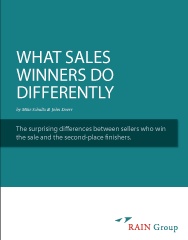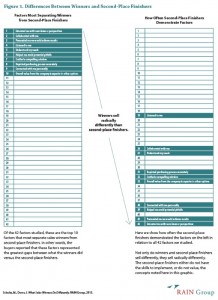What Sales Winners Do Differently: Q&A with Mike Schultz
For many years now I have been a contributing editor at RainToday.com, the premier online resource for professional services sales and marketing. Besides a ton of articles, books, special programs, and online learning forums, they occasionally do some seriously good sales research. They have just yesterday come out with their latest, a report called What Sales Winners Do Differently.
I sat down with friend Mike Schultz, founder and publisher of the Rain Group, and asked him to headline for Trust Matters readers just what they found out. Have a look, then download the full report, compliments of Rain Group.
——————–
Charlie Green: First, tell us – big picture – what did you research, why, and what did you find?
Mike Schultz: It was pretty quiet in the world of sales approaches for the past 30 years or so. In the last few, however, especially with the popularity of books like The Challenger Sale, there’s been a new vigorous debate about one question: How should people approach selling these days?
The answers have been all over the place, with wildly divergent ideas and opinions.
To add to the conversation, we asked ourselves, “What are the winners of complex sales doing to win, and what are they doing differently than the sellers that came in second place?”
Charlie: A sensible and forthright question: of whom did you ask it?
Mike: We talked to buyers. We studied more than 700 B-to-B sales (from buyers responsible for $3.1 billion in annual purchases) to find out what the providers they selected did to win their business, and why the providers they didn’t select lost.
What we found is that sellers that win:
- Connect with buyers as people, and connect the dots between needs and solutions
- Convince buyers that the ROI is achievable, the risk is worth taking, and that they are the best choice among the available options
- Collaborate with buyers both in how they behave, and in the sense that they, as sellers, bring ideas and value to the table.
We cover these concepts in depth in the report.
Charlie: OK, let’s unpack this now. In the report you say, “Winners don’t just sell differently, they sell radically differently, than the sellers who came in second place.” When people make a statement like this, I often find it to be more puff than substance. But when I looked at your data, I thought your statement was quite appropriate.
Mike: I think you’re referring to this chart. On the left, in dark, are the top 10 factors that most separate the sales winners from second-place finishers. In other words, the buyers reported that these factors represented the greatest gaps between what the winners did versus the second-place finishers.
On the right you see how often the second-place finishers demonstrated the factors on the left in relation to all 42 factors we studied.
Charlie: This chart’s hard to read in the blogpost, but one thing jumps out at you – the top ten reasons the winner won – in dark, on the left-hand chart – ended up really low for those who lost. For example, #2 on the reasons winners won was “collaborated with me.” But the ability to collaborate was way down at #26 for the losers. And most of the top ten results were more extreme than that!
So, what are some big take-aways?
Mike: Lots, but here are three to start:
First, as you noted, the difference between winners and second-place finishers is stark.
Second, the top two factors demonstrated by the winners are “educated me with new ideas or perspectives” and “collaborated with me.” We looked at 42 factors. Who would have guessed these two would be right at the top? Not us. As you might imagine, we keyed in on them quite a bit to analyze what this told us.
At first blush, they might not seem to go together, actually, but they do. What this tells us is that the seller, themselves, brought value to the table over and above the products and services they had to sell, and over and above the reputation of the company.
Especially in industries where sellers complain about the commoditization of what they sell, the difference between winning and losing lies in large part in how the sellers lead their interactions with buyers.
Third, “understood my needs” and “crafted a compelling solution” appear on this list and also showed up as important factors in a number of other places in the research. As much as some people want to declare solution selling dead, it’s not. Not even close.
Sellers and companies that ignore fundamental solution sales concepts do so at their own peril.
Charlie: Now, I’ve got to ask you; one factor you studied was whether the buyer thought the seller “was trustworthy.” It’s not in this chart. How did the concept of trust show up in the report?
Mike: It’s not in that chart because, for the most part, buyers reported both winners and second-place finishers were trustworthy. It’s not a massive difference between the two groups, but the winner group was, indeed, perceived to be more trustworthy.
Notably, when the second-place finisher wasn’t seen as trustworthy, the buyers reported it as the 8th most important factor for the seller to change in order for the seller to win their business.
We also analyzed the statistical key drivers of buyer satisfaction with the buying process, buyer loyalty, and buyer willingness to refer.
“Was trustworthy” was a key driver of buyer loyalty, and was the #1 key driver of willingness to refer new business to the seller.
Last point, we found that buyers were very tuned in to the concept of minimizing risk. Other factors we studied, aside from the trustworthiness of the seller, related to experience in their industry, experience in the area they had need, whether the seller inspired confidence in the company, how respected the provider was at their organization, and so on.
The factor “was trustworthy” was important on its own, but themes of trust also showed up as important throughout.
Charlie: Can you share with us what some people might believe is important for sales success, but that you found wasn’t as important as the other factors?
Mike: Yes; here are three:
- People often say to sellers, “Don’t talk too much.” But buyers didn’t really care about this. As long as the seller felt listened to, the airtime taken by the seller was immaterial. How much the seller advocates (talks/educates) and how much they inquire (ask questions) are wholly situational.
- We tested the importance for the seller of introducing “valuable” ideas versus “new” ideas. You might wonder “splitting hairs?” It’s not; the distinction is amazingly important. If the buyer perceived an idea to be valuable but not new, it wasn’t important for sales success. Buyers don’t need to be validated about something they already knew was a good idea. It’s the newness of the idea or perspective they found important.
- “Deepened my understanding of my needs” was not typically important. Thus, the ubiquitous advice to diagnose needs shouldn’t be applied everywhere. Situationally it may be warranted, but sellers shouldn’t diagnose as a rule. However, sellers shouldn’t throw out the “needs understanding” baby with the “diagnosis” bathwater. It’s important for sellers to demonstrate they understand the needs, but sellers don’t always need to dig, dig, dig to produce some kind of “ah hah” moment in the needs discovery process.
Charlie: You mentioned the plan is to turn this research into a book. Is there something you can share with us from the research that’s not in the report, but that we might see in the book itself?
Mike: We looked at how opportunities originally arrived on buyers’ radar screens. When the buyer reported they were likely to be loyal to the provider, 22.9% of the time, “a seller brought this opportunity to my attention.”
When the buyer was likely to be a switcher (not loyal), they found out about the opportunity from the seller only 7.8% of the time.
In other words, loyal buyers were about three times more likely to start a buying process because the seller brought something to their attention.
And you’ll like this; the key drivers of buyer likelihood to buy again were all factors related to trust, including confidence in the company, seller professionalism, experience, and, of course, the trustworthiness of the seller as a person.
Charlie: Tell me if I’m hearing this right: greater trust leads to greater openness and receptivity to new ideas; is that what you’re hearing? It surely makes sense from a trust perspective. And it means brilliant ideas alone don’t carry the day – first you’ve got to be listened to.
Mike: That’s right. The data say that the more the buyer trusts, the more likely they’ll be open to a seller’s ideas – both accepting meetings with you to discuss new ideas and opportunities, and eventually moving forward with them. Trust is a huge factor in what is perhaps the greatest opportunity to increase revenue at most companies: the ability of the seller to create their own opportunities and drive their own demand.
That’s pretty powerful.
Charlie: Mike, this is great stuff. You’ve done a real service here; I can’t wait to dig into the survey itself.
Again, people can get their complimentary download of What Sales Winners Do Differently. Mike, I hope you get a boatload of people reading it.
Mike: Thanks Charlie, I appreciate the opportunity to share it with the Trust Matters readership.



This is such important research Charlie – thanks for publishing this analysis.
What’s great about it is that it doesn’t do what “challenger” did – deliberately misquote and stereotype previous approaches to selling just so it could say “this is completely new, you need to buy this book”. The recommendations build on successful practices that have gone before – as most good progress does.
In terms of the main finding that the top two characteristics of winners in the sales arena being “brought me new ideas and perspectives” and “collaborated with me it put me in mind of the interview we did a while back when I asked you “what’s the best way of building trust with a potential clients” and you said…
“Have a point of view….but get it across respectfully”.
New ideas + collaboration.
(Cheap plug for our interview: it’s here… http://www.ianbrodie.com/more-clients-podcast/charlie-green/)
Cheers
Ian
Thanks, Ian. Really apprecate the comment.
Just to be clear, educating on new ideas and perspectives and collaborating were the top two characteristics that *separate* winners from second place finishers. The top characteristics that winners displayed were “was professional” followed by “experienced in the area I have needs.”
The reason the chart in this article is so important is that the second place finishers did these as well. What was important to find was what separated the two groups. The biggest separation areas are in the chart above.
Meanwhile, the point came across just right. “Have a point of view” and “get it across respectfully” is a great way to put it.
Cheers.
Mike
Very well presented post.. Appreciate your good work
We just had a scenario that demonstrates some of your points:
Our salesguy offered his technical resource to spend time looking at our environment to help find problems. Great move: understand the problems, help fix some for free, sell some product to fix others.
His technical engineer however was so obviously focused on selling one particular feature, that even though he did help me some, the visit ended up being a big net-negative. I don’t want any further advice from him – as I believe that all his technical recommendations will be self-serving.